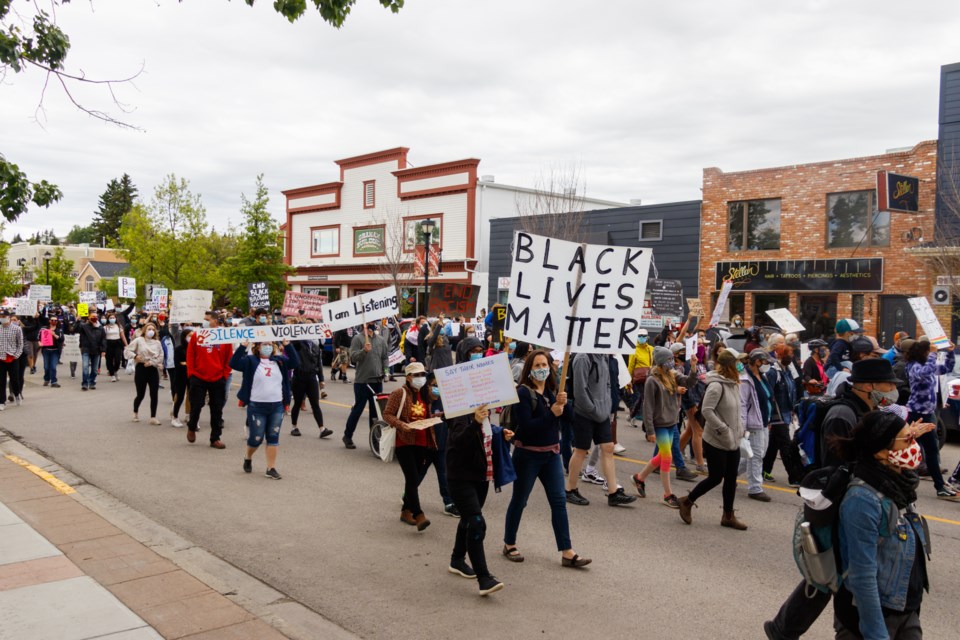COCHRANE— Hundreds of protestors peacefully marched in downtown Cochrane Sunday (June 14) afternoon in support of the Black Lives Matter movement.
Carrying signs that included “hands up don’t shoot,” “silence equals violence,” “#Black Lives Matter Indigenous people too,” and “ever watched an eight-minute murder” protesters called for an end to racism through education and active engagement with communities.
Born and raised in Stoney Nakoda First Nation Daryl Kootenay spoke at the rally to represent Indigenous people and his community in support of Black Lives Matter, Missing and Murdered Indigenous Women and Girls, residential school survivors, and others whose voices have been lost.
“It’s a lot of understanding the truth and being aware and educated of the severity of the true history,” Kootenay said.
He explained that there has been systemic racism present in Canada for centuries robbing many people of colour, Indigenous people and Canadians of their ability to thrive.
Now is the time to hear the truth and inspire people to share stories, learn and make right relations that have been damaged by Canada’s systemic racism, he said.
“We can have unity and work together to tackle Reconciliation,” Kootenay said.
The biggest step people can take to support Reconciliation is educating themselves on the issues, culture and experience of people of colour, Kootenay said, and sharing what they have learned with friends and family as an advocate for those who have been disenfranchised.
“It’s up to us as individuals to make that effort and continue to be involved,” he said. “It takes a long time it takes a lot of primarily non-Indigenous peoples to open up the pathway and make that space and environment so Indigenous people can come into to schools, can come into community meetings, to feel comfortable and feel like they’re not going to be judged and they’re not going to be unwelcomed.”
It will take time and effort to foster these relationships, he said, adding that if people can set aside their differences and focus on the positive a relationship can grow between Indigenous and non-Indigenous people.
“We just need to have more of those opportunities,” Kootenay said.
Calgary activist Adora Nwofor said it was an emotional experience to be a part of the rally, explaining that it was inspiring to see Cochranites united and looking to talk about and put an end to racism.
“Going forward people need to understand their privilege— They need to educate themselves,” Nwofor said. “Nobody educated me about racism as a child they just treated my brutally because racism is violence.”
The key aspect for those looking to promote anti-racism is to learn about it, understand what is and then apply what they have learned into action.
“People want to talk about diversity, people want to talk about inclusion but they are not applying the actual change," she said.
Nwofor called on the crowd to embrace anti-racist action by actively engaging and calling out racist behaviour when they see it.
“I want people to take forward from here that change is here now and you can do it right now. It doesn’t matter if you didn’t do it before, do it from here on out and continue to grow and everything will change for everybody," she said. "It will be a better world.”
RAAR- Rural Alberta Against Racism organizer and rally guest speaker Taylor McNallie knows first hand the racism people of colour can experience in rural areas.
McNallie grew up in Cremona and said it was the first place someone called her the N-word. She was only 11 years old.
“Where my racist history took place, where it all started for me was in rural communities and noticing that there’s not a lot of support there’s not a lot of resources,” McNallie said. “There’s not a lot of people willing to speak out against what’s happening.”
It can be challenging in rural communities because there can be racism that has been learned over generations, she said.
“Even that boy who called me the N-word I don’t think he really knew what it meant, why it was so offensive. He knew it was something to put a person of colour down and he used it."
It can be challenging because people can be unwilling to confront how pervasive racism can be in communities, she said, and at times some people choose to ignore it and pretend like the problem is not there.
The Cochrane Black Lives Matter rally highlighted the need to educate and bring resources to help break the cycle of racism and discrimination in communities.
It has been exciting to see the incredible crowds gather in small towns across the province and stand in solidarity with the Black Lives Matter movement when they visit.
“They want to help, support and make change right now,” McNallie said.
For those looking to help maintain the momentum from the Cochrane Black Lives Matter rally McNallie said she recommends reaching out to town councils to ensure the conversation continues. Other steps can including pushing to ensure the community is actively working to become inclusive, ensuring educational resources are available in the library and sharing the stories and history of people of colour in schools.
McNallie said RARR- Rural Alberta Again Racism is planning an additional Black Lives Matter protests in the coming months. An events calendar and educational resources can be found on the RAAR Facebook page.
RAAR is planning a rally for Cremona but the group has received some push back from the community. McNallie said they are continuing to finalize plans.
“Do you want to fix that to make it a better community or do you just want to put a veil on things,” she said.




